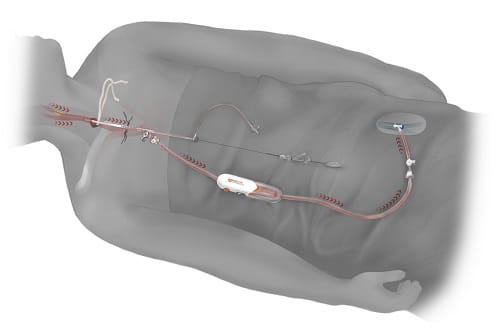About Transcarotid Artery Revascularization
Transcarotid artery revascularization (TCAR) is a less invasive treatment option for some patients who have carotid artery stenosis. The TCAR procedure is one of three treatment options your doctors may recommend. The other two are carotid endarterectomy (CEA) and carotid stenting (CAS).
TCAR is a relatively new, innovative procedure. It received clearance by the Food and Drug Administration in 2015 and has been adopted across the United States as an alternative procedure to open carotid surgery. BayCare has performed more than 800 TCAR procedures.
TCAR is a hybrid treatment approach that uses direct access to the carotid artery through a small incision at the neckline. A vascular surgeon then places a tube into the carotid artery connected to a TCAR system. This system filters the blood to remove any small plaque particles, reducing the risk of stroke during the procedure. A vascular surgeon implants a stent directly into the carotid artery to open up the plaque blockage. After the stenting process is complete, the TCAR system is removed, and blood flow returns to normal.
-
Before TCAR
Before TCAR
While your vascular specialist and surgeon will determine if you're a candidate for TCAR, this procedure is typically a great option for patients who may be at higher risk for traditional open surgery (CEA). This may be due to age, anatomy, or additional medical conditions.
Prior to TCAR, your doctor may need the following diagnostic tests:
- Blood / lab work to understand your overall health as well as clotting factors in your blood
- Carotid artery ultrasound to understand the severity of carotid stenosis
- Carotid angiography to identify the exact locations of and visualize the blockages. This is often done using a CT scan with contrast.
- Neurological assessment to determine how carotid artery stenosis may be affecting the brain’s neurological function
If you and your care team determine TCAR is right for you, your procedure will be scheduled, and you’ll get a date for your pre-procedure appointment. At this appointment, you’ll receive a list of pre-procedure instructions including what time to stop eating/drinking, what medications to take and which ones to avoid. You'll also receive a phone call from the hospital in the days before your procedure with the exact time of arrival.
-
TCAR Procedure Day
TCAR Procedure Day
On the day of surgery, you'll check in at your BayCare hospital location. Once checked in, your care team will go over any consent forms and you'll be escorted to a pre-procedure room where you'll change into a hospital gown, your IV will be started and any other necessary pre-procedure items will be taken care of. You'll then be moved to the operating room where the TCAR procedure takes place. TCAR procedures are typically performed under local anesthesia and conscious sedation. In some cases, general anesthesia may be used. The entire TCAR procedure typically takes one and a half hours to complete.
-
After TCAR
After TCAR
TCAR patients typically spend one night in the hospital to monitor their vital signs, blood flow, and neurological status. At discharge, you’ll get instructions on what activities to avoid (no heavy lifting for a week, for example), medications to start and any lifestyle or diet changes. You'll have a small incision in your neck that needs healing. Your discharge instructions will also cover things to watch out for such as signs of infection, bleeding, chest pain or symptoms of stroke.
You’ll have follow-up appointments with your vascular surgeon, typically within one to two weeks after the procedure. Your doctor may order another carotid ultrasound or other imaging studies to monitor the stent and artery.
The Advantages of a TCAR Procedure
For those who qualify, TCAR procedures offer many benefits including:
- Reducing the risk of stroke through the innovative technology that directs the blood away from the brain and prevents plaque from reaching the brain during the procedure
- Minimally invasive procedure with a smaller incision
- Quicker recovery time with most patients going home after an overnight stay
- Safer option for high-risk patients when compared to traditional surgery; it reduces the strain on other organs
- Lowers the risk of nerve injuries since it isn't an open surgical procedure
- Less disruptive to natural blood flow versus other procedures

What You Need To Know About Carotid Artery Stenosis
Dr. Yves A. Gabriel leads an informative discussion about Carotid Stenosis, including how it is diagnosed, and treatment/management options.
Find a Location
BayCare facilities that perform the TCAR procedure:
Mease Countryside Hospital located in Safety Harbor, Florida
Morton Plant Hospital located in Clearwater, Florida
Morton Plant North Bay Hospital located in New Port Richey, Florida
St. Joseph’s Hospital located in Tampa, Florida
St. Joseph's Hospital-North located in Lutz, Florida
St. Anthony’s Hospital located in St. Petersburg, Florida
Winter Haven Hospital located in Winter Haven, Florida
Find a Vascular Surgeon
Our vascular surgeons can determine if the TCAR procedure is right for you or a loved one. For a referral to a vascular surgeon who performs the TCAR procedure, fill out the referral form.


